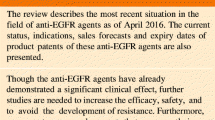Abstract
The epidermal growth factor receptor (EGFR) is a member of the tyrosine kinase group of growth factor receptors. Following the binding of ligands such as the epidermal growth factor (EGF) with EGFR, activation of signal transduction pathways can lead to changes in cellular proliferation and differentiation. EGFR is highly expressed by many tumors, and is associated with disease with poor prognostic features. EGFR and its downstream signaling pathways are, therefore, promising antitumor targets for drug development. Using ZD1839 (‘Iressa’) as an example of a small molecule inhibitor of EGFR, the utility of targeting EGFR in the treatment of breast cancer will be discussed. ZD1839 is an example of an orally active, selective EGFR tyrosine kinase inhibitor, which has shown extensive preclinical activity and evidence of being active combined with a favorable tolerability profile. Breast cancers have been shown to express high levels of EGFR and hormone-resistant disease is associated with an increased expression of both EGFR and EGFR ligands. ZD1839 has shown in vitro activity as both monotherapy and in combination with other agents such as paclitaxel or doxorubicin, inhibiting the growth of breast cancer cells that are resistant to endocrine agents such as tamoxifen. Against hormone-responsive cells, the combination of ZD1839 with endocrine therapy produces synergistic activity. ZD1839 has also shown growth inhibitory activity against xenografts initiated from ductal carcinoma in situ tissues, indicating that EGFR inhibition may have a role in the treatment of early-stage breast cancer. EGFR is, therefore, a rational target for the development of novel therapies, and promising preclinical studies indicate that EGFR-targeted therapy may have a role in the treatment of breast cancer. The results of clinical trials with ZD1839 in breast cancer patients are awaited with interest.
Similar content being viewed by others
Author information
Authors and Affiliations
Rights and permissions
About this article
Cite this article
Morris, C. The Role of EGFR-Directed Therapy in the Treatment of Breast Cancer. Breast Cancer Res Treat 75 (Suppl 1), 51–55 (2002). https://doi.org/10.1023/A:1020370018668
Issue Date:
DOI: https://doi.org/10.1023/A:1020370018668




